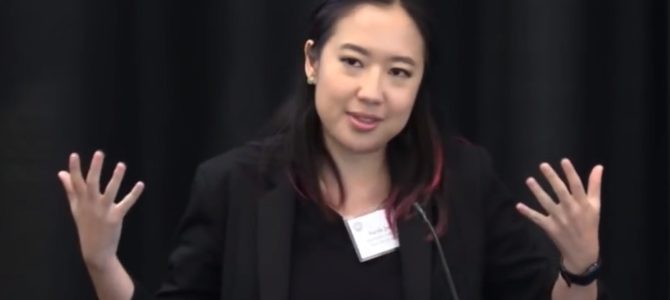
The New York Times naming Sarah Jeong to its editorial board, and hiring her as its lead tech writer created a kerfuffle once it emerged that she had engaged in a series of racist tweets about white people. But the real question should be: Why wouldn’t the Times hire someone with an antipathy to white people?
That question is not answered by the defenses the NYT or Jeong have offered. As already noted by Joy Pullmann, the core defense—that Jeong was merely engaging in satire—echoes the common defense of many racist trolls. Moreover, a careful reading of their defenses reveals that neither is an apology for the racism at issue. Rather, the non-apologies address the style of Jeong’s tweets more than their racist substance. That is almost certainly no accident.
The defense presents Jeong as an Asian-American journalist provoked by online trolls. Yet in 2016, when Jewish conservatives were subjected to a torrent of anti-Semitic attacks on social media, the NYT and the rest of the establishment media did not care, until similar attacks were heaped upon journalists like Jonathan Weisman of The New York Times. The NYT’s newly rediscovered concern over racist trolls and social media mobs seems almost entirely situational.
Conversely, those Jewish conservatives have zero chance of ever getting named to the NYT editorial board, even without trails of racist tweets. The exceptions prove this general rule. The hiring of barely conservatives Bret Stephens and Bari Weiss as columnists required a series of town hall meetings to soothe seething staffers in the NYT newsroom.
It’s easy to understand why the NYT staff reviles Weiss, because she tends to expose the paper’s lack of standards. She wrote about Linda Sarsour and other leaders of the Women’s March embracing virulent racist Louis Farrakhan (and various domestic terrorists) without condemnation from progressives. The news side of the NYT got around to covering that story seven months later—once, before dropping it. After all, why would you let the relationship that tens of congressional Democrats have enjoyed with the Minister of Hate cloud your political narrative?
The Jeong hiring and Weiss reaction tell you a great deal about where the NYT and progressivism are and where they’re headed. They don’t care a great deal whether progressives dabble in racism, misogyny, homophobia, anti-Semitism, anti-Catholicism, or general antipathy toward Christians, so long as it advances the progressive agenda of the moment.
Instead, progressives attempt to redefine their bigotry out of existence. Progressives have defended Jeong on the ground that her invective—which included comparing white people to “goblins”—was not racist, because you cannot have racism without the power to oppress. This claim, as David French notes, “confuses the gravity of an offense with the existence of the offense.”
Equally relevant is that the claim seeks to replace the common definition of racism with the faculty lounge mutilation of the term. The redefinition is simply another manifestation of the progressive notion of accepting or rejecting a standard as political advantage requires.
As French further suggests, linking racism to the possession and exercise of power itself becomes a problem when one of the most influential media entities on Earth is elevating someone with Jeong’s anti-white attitudes to its editorial board. And The New York Times is just one prominent example of the problem.
As noted earlier, the current progressive concept of racism comes from faculty lounges at the sort of institutions that engage in “whiteness studies,” permit racial segregation under the rubric of “safe spaces,” and so forth. Progressives dominate academia in America, and from there dominate journalism, law, entertainment, and corporate human resources and public relations departments. That last category encompasses all the Big Tech companies that serve as the infrastructure of the internet.
In short, in the Information Age, most of the levers of information remain firmly in progressives’ grip. Accordingly, it is difficult to avoid examining the resulting flow of information.
To be fair, America is a complex place. It would be an oversimplification to suggest there is a single version of the vision progressives have for America.
But it would not be a stretch to say that if a poll were taken among the elites of academia, the media, etc., they would name Ta-Nehisi Coates as one of our leading public intellectuals, perhaps topping the list. Coates tends to think about race in the same way as white nationalist Richard Spencer does, according to a convincing NYT op-ed.
Put another way, Coates tends to think about whites the way Jeong tweeted. The difference is that Coates is a much better prose stylist and has far more space than the limits Twitter imposes.
However expressed, such views are of a piece with the progressive view that America is simply a manifestation of white supremacy—a claim occasionally extended to the Enlightenment in general. They are also of a piece with a Democratic Party that spent a decade strategizing around the theory of an “emerging Democratic majority” that would eventually dominate American politics because old white people would eventually die.
In the progressives’ intellectual swamp, these sorts of attitudes about white people are common and working their way toward dominance. These attitudes are rarely questioned by the so-called center-left, let alone condemned. This is why The New York Times and Jeong do not apologize for the actual content of her racist tweets.
The scandal is not that the NYT hired Sarah Jeong. The scandal is that so many progressives cannot conceive of it being scandalous.









